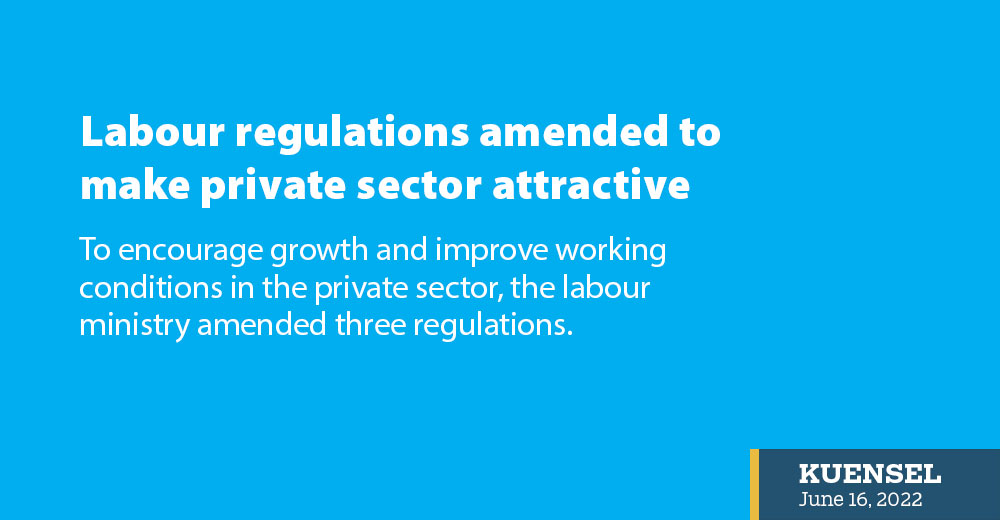Yangyel Lhaden
To encourage growth and improve working conditions in the private sector, the labour ministry amended three regulations.
The changes in Regulations on Working Conditions, 2022, Regulation on Occupational Health, Safety, and Welfare, 2022, and Regulation on Occupational Health and Safety for the Construction Industry,2022, present improved benefits for the welfare of both employers and employees.
Layog Lyonpo ( Labour Minister) Karma Dorji said that the major issue with the unemployment situation in the country was that there were many loopholes in the private sector making it not an ideal choice for Bhutanese to work.
“Our intention to amend the regulation is to make the private sector conducive so that people would be encouraged to work in the private sector,” the minister said.
Karma Dorji said that one of the many issues working in the private sector were poor salary, lack of occupational safety, and lack of social security. “In the new regulations, we have tried our best to make new regulations as attractive as civil service wherever possible.”
Regulation on Working Conditions, 2022
Executive Specialist Suman Pradhan with the Department of Labour said that the amended regulation was in an easy reading format and avoided confusion for readers.
“The last version had many regulations under regulations on working conditions and penalty was a chapter which had no uniformity and was not specific,” he said.
The major changes in this regulation are regarding provident fund (PF).
The regulation has introduced portability of PF from one employer to another or from one financial institution to another. The regulation has also done away with the requirement of at least five years’ service to receive PF paid by employer, and the requirement of at least five employees in a private firm to be eligible to apply for PF.
Suman Pradhan said that there were several issues in regulation on working condition, 2016 regarding PF when employees worked on projects for a certain duration because their PF could not be transferred from one employer to another.
He said to ensure social security for private employees they did away with the requirement of at least five employees in a private firm as mandated in the 2016 regulation. “Any number of employees can apply for PF.”
Paternity leave has been increased to 10 days from five days. The penalties have been incorporated under relevant chapters and made uniform.
New chapters for recruitment and selection are added in the regulation which was earlier separated from regulation on working conditions, training for the corporate and private sector, and registration of working places are added.
Suman Pradhan said that when issues with training arose there was no basis or regulation for labour inspector to inspect which was why a new chapter is added. “With compulsory registration of working places, it will ensure we can collect accurate data for labour administration.”
Other regulations
The occupational health safety regulations have major changes in worker’s compensation, requirement of construction safety supervisors, a uniform penalty in both regulations, change in requirement of first aider and formation of health and safety committee.
Labour Officer Phuntsho Dendup said that the department had to review the old regulations because they had to change with changing times, and needs. “We tried to make a comprehensive regulation which will serve the need and direct labour inspectors as well as provide clear regulations to address problems.”
He said that during inspection the team found many industries exceeded the permissible limit of pollutants. “Workplace accidents are high in the construction sector and we stress more on safety helmets and boots but it’s also equally important to take care of occupational diseases because it takes time to develop health issues when exposed to pollutants.”
The labour ministry in the last fiscal year recorded 24 workplace accidents out of which 70.8 percent were fatal accidents and the construction industry comprised 82.4 percent.
Phuntsho Dendup said that during an inspection, a printing house was found using benzene to clean printing rollers which is carcinogenic in nature. Officials asked the printing house owner to replace it. “We have made changes in the regulation to address such issues.”
The new regulation requires an emergency action plan for workplaces of enterprises with 20 or more employees.
Layog Lyonpo said that for successful implementation of the regulations both employers and employees should take full responsibility to implement them and report to the ministry for any grievances. “The ministry cannot reach all places to inspect though we will carry out routine inspections with limited human resources.”
Karma Dorji said that amended regulations aimed to make private sectors attractive to encourage more Bhutanese to work in the private sector. “The 13th five-year plan has a huge estimated budget of Nu 1,250 Billion out of which majority would go in economic revival and boom the private sector.”


